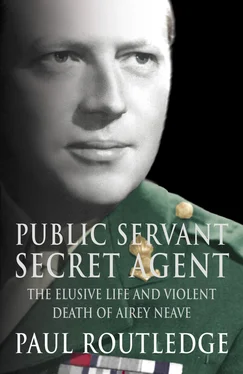1 ...7 8 9 11 12 13 ...23 He was posted to an anti-aircraft Searchlight Regiment and spent an unromantic six months in a muddy field in Essex learning his trade, before being dispatched to a searchlight training regiment in Hereford. It was hardly Clausewitz. An impatient Neave preferred to be in the field, like Rupert Brooke and his other war heroes of history. He was soon to have all the action he wanted, and more. In February 1940 he was sent as a troop commander to Boulogne, where the uneasy peace of the ‘phoney war’ reigned. Lieutenant Neave was placed in charge of an advance party of ‘rugged old veterans’ from the First World War, mostly industrial workers with some clerks and professional men, a ‘vocal and democratic lot’ who did not consider themselves crack soldiers but made up for lack of infantry training with a willingness to fight. They were equipped with rifles (though many had never fired one), old Lewis guns, a few Bren guns and the new Boys anti-tank rifle which none of them knew how to use. Neave’s troop, part of the Second Battery of the 1st Searchlight Regiment, was tasked mainly with operating searchlights in fields around large towns, dazzling bombers and aiding anti-aircraft gunners. The searchlight soldiers were held in little esteem, one Guards officer describing their contribution as ‘quite Christmassy’. An indignant Neave kept his counsel and waited for the underdogs to show their mettle.
He did not have long to wait. Military folklore says that Hitler’s decision to invade the Low Countries and France was made over lunch with von Manstein, Field Marshal of the Wermacht Gerd von Rundstedt’s chief of staff, over lunch on 17 February 1940. On 2 April, the Prime Minister Neville Chamberlain confidently told the Commons: ‘Hitler has missed the bus.’ Early in the morning of 10 May, the Nazi Blitzkrieg on the Low Countries and France began. Under the brilliant direction of General Heinz Guderian, German panzer divisions smashed their way through the Ardennes, overrunning Belgium and striking deep into France. Within five days, Paul Reynaud, the French Prime Minister, was telephoning Churchill to say: ‘We have been defeated.’ It was an appalling prospect. The British Expeditionary Force numbering hundreds and thousands of men, sent to oppose any German invasion, was in danger of being surrounded and cut off in northwestern France. The war for Europe was in danger of being lost before it had begun. Still, service chiefs in London judged that Hitler’s lines of communication had become so extended that a frontal attack on the Channel ports was unlikely. ‘It was not to be believed,’ wrote war historian Michael Glover, ‘that, within two or three days, they could threaten, far less capture, Boulogne and Calais. A week earlier the idea would have appeared equally fantastic to the German High Command.’ 3
On 17 May, after a depressing summit in Paris with Reynaud and the French High Command, Churchill, now Prime Minister after the resignation of Neville Chamberlain, ordered his chiefs of staff to draw up plans for withdrawal of the BEF. Guderian’s panzers were racing across northern France, making for the coast and the Channel ports. Neave and his searchlight battery were in Coulogne, a few miles south-east of Calais, right in the way of the German advance. He arrived there from Arras on 20 May, having squashed himself into a tiny khaki-painted Austin Seven with his large and belligerent driver, Gunner Cooper. His troops followed behind in 3-ton army lorries. As they drove through Lens and St Omer, the tide of refugees fleeing west increased. In the ancient town of Ardres, a woman shouted that they were cowards running away from the Germans and spat at the column.
Coulogne had seen British soldiers before. In the time of Henry VIII, when the English had occupied Calais, it was an outer stronghold. In the First World War, it had been a base camp. Neave quartered himself in the Mairie, in the town square. For the first night, they were spared the bombing that had sent the French fleeing for their lives. The young lieutenant imagined that his role in the forthcoming defence of Calais would be commanding his searchlight battery. He was just twenty-four, ‘unmilitary and with opinions of my own’. However, he also later vouchsafed that he and his men were ‘ready to die, or at least expecting to die’. 4 The Germans did their best not to disappoint them. As he dozed under a chestnut tree in front of the Mairie in the hot afternoon of 23 May, a German light attack aircraft scored a direct hit on the building, sending tiles tumbling down over him. It was nearly fatal. More mortar bombs exploded among the refugees, killing some of them and Neave’s dispatch rider, Gunner Branton. The casualties included a young girl. Neave noticed a British soldier gently drawing her tartan skirt over her knees to preserve decency even in death. The air raids were followed by panic rumours among the French that German armoured divisions were closing in, but a disbelieving Neave thought they might only be lightly armed reconnaissance groups. How could British High Command not know the whereabouts of Guderian and his tanks?
Searchlight detachments were ordered to converge on Coulogne, gathering a force of about sixty men for the defence of this ‘ghastly bottleneck’. Neave’s men dug trenches in the southern sector and put up rather inadequate roadblocks comprising furniture from the local school and the village hearse. Their work was hampered by the spate of fugitives from the battle zone, whose pathetic columns stretching up to half a mile long had been infiltrated by spies and fifth columnists. At one stage, Neave was forced to draw his .38 Webley revolver on a crowd of refugees threatening to break through the roadblock, prompting cries of ‘Don’t shoot, mon lieutenant !’ The German tank thrust reached them in the afternoon of 23 May but was held back for five precious hours by the Searchlight Regiment’s spirited defence of its HQ at nearby Orphanage Farm. Neave’s Bren gunners took part in this action, but almost fired on their own side until he moved them forward. After the farm came under intense artillery fire, the order to retreat towards Calais was given at about 7.00 p.m. Neave was told to go back into Coulogne to blow up a new piece of kit known as the ‘cuckoo’, a sound-location device which at all costs must not be captured. With a sergeant and a sapper, he tried valiantly with gun cotton to destroy the trailer on which the secret equipment was mounted. As they tried feverishly to carry out the order, two French aviation fuel drivers set fire to their tankers alongside. The ‘cuckoo’ blew up and Neave’s party escaped, choking on fumes from the blaze, to the Calais road.
They found only relative safety in the city. Guderian’s tanks had been briefly, and inexplicably, halted the previous week on Hitler’s personal instructions. His race to the sea might otherwise have been complete by this stage of the war, trapping and capturing the BEF gathering on the sand dunes of Dunkirk just up the coast from Calais. But now he was advancing at full speed and Calais was in the way of his main objective: the British army. His initial plan was to bypass the port and take Dunkirk with the Tenth Panzer Division, but a determined counter-attack by the British south of Arras on 21 May checked his drive, and the German High Command ordered Guderian to wait on the Somme, robbing him of the impetus that could have altered the direction of the entire conflict. Taking advantage of this breathing space, the British threw reserves across the Channel into Calais, elements of the Royal Tank Regiment, the Queen Victoria’s Rifles and the 60th Rifle Brigade. Their orders were unclear and constantly changing. Meanwhile, service chiefs began emergency planning for Operation Dynamo, the evacuation of 330,000 soldiers of the BEF from the sands of Dunkirk by the Royal Navy and a flotilla of ‘little ships’.
Читать дальше












